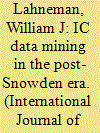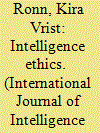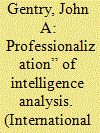|
|
|
Sort Order |
|
|
|
Items / Page
|
|
|
|
|
|
|
| Srl | Item |
| 1 |
ID:
146421


|
|
|
|
|
| Summary/Abstract |
The 50th anniversary of President John F. Kennedy (JFK)'s assassination passed in November 2013, but the Central Intelligence Agency (CIA) still refuses to declassify numerous documents related to major events of his presidency. How many individuals have unsuccessfully requested declassification of JFK-era papers in the past decade is unknown, but a few scholars have publicized the existence of particular documents that, despite their Freedom of Information (FOIA) or Mandatory Declassification Review (MDR) requests, are still being kept secret. Among the unsuccessful have been efforts of the National Security Archive to get the CIA to declassify a major document relating to the failed 1961 Bay of Pigs operation in Cuba. I have an indirect relationship with that document and the related declassification I have pursued unsuccessfully for the past nine years. Most of them describe congressional testimony by CIA leaders about Agency operations in the 1961–1963 timeframe in various locales, including Cuba and Vietnam.
|
|
|
|
|
|
|
|
|
|
|
|
|
|
|
|
| 2 |
ID:
146420


|
|
|
|
|
| Summary/Abstract |
Henry Stimson spoke those now famous words to explain his reason for eliminating the Cipher Bureau, the code breaking organization that had been operating under joint State Department—Department of War sponsorship since the end of World War I. The Cipher Bureau, a legacy organization of the U.S. Army's Cryptologic Service, had distinguished itself during the war in providing important intelligence obtained by breaking foreign diplomatic and military codes and ciphers. During the interwar years, the Cipher Bureau was able to break the diplomatic codes of several nations. Incidentally, that ability to intercept foreign communications was possible only through the secret and illegal cooperation of the entire American cable industry, which operated the transoceanic underwater cables that constituted the leading edge long-range communications technology of that era.
|
|
|
|
|
|
|
|
|
|
|
|
|
|
|
|
| 3 |
ID:
146423


|
|
|
|
|
| Summary/Abstract |
A spotlight has been placed on the conduct of intelligence activities pertaining to the revelations of controversial intelligence affairs (i.e., dubious methods of interrogation, such as those used at the Guantánamo Bay detention facility; the comprehensive intelligence gathering conducted by NSA, and more). As a result, the number of scholars and intelligence practitioners concerned with intelligence ethics and with the moral justifiability of the activities conducted by intelligence services has increased.1 While the issue of intelligence ethics is now present in various scholarly debates, especially in the domain of Intelligence Studies, very little attention is being drawn to developing core understanding of the concept. Also, intelligence ethics is neither homogeneous nor yet embedded as a solid research field.
|
|
|
|
|
|
|
|
|
|
|
|
|
|
|
|
| 4 |
ID:
146419


|
|
|
|
|
| Summary/Abstract |
Since the 11 September 2001 (9/11) terrorist attacks on New York City and Washington the United States Intelligence Community (IC) has increasingly included participation from agencies with non-intelligence missions. The IC has evolved as a result of the new perspectives and information contributed by these agencies. But non-intelligence agencies still face a cultural and procedural scrimmage, in which the traditional intelligence agencies continue playing by their established rules, and the other participants scramble to fit in.
|
|
|
|
|
|
|
|
|
|
|
|
|
|
|
|
| 5 |
ID:
146418


|
|
|
|
|
| Summary/Abstract |
In recent years, for the first time in the history of the U.S. Intelligence Community (IC), a debate among scholars and some practitioners has arisen about whether intelligence analysis is, or can be, a “profession”—and by what standards analytic professionalism should be defined and judged. The dominant academic view seems to be that analysis should be, but is not, a profession, defined in ways similar to those of such recognized professions as medicine and law. More recently, a version of such thinking has emerged in the Department of Defense (DoD), with the Office of the Undersecretary of Defense for Intelligence (USD(I)) mandating the development of certification and accreditation standards for personnel who perform all intelligence-related job categories in all military and civilian elements of the DoD, which the department calls the Defense Intelligence Enterprise (DIE).
|
|
|
|
|
|
|
|
|
|
|
|
|
|
|
|
| 6 |
ID:
146422


|
|
|
|
|
| Summary/Abstract |
Think tanks have, over time, been able to gain considerable success in influencing the security policy process in the United States. Success can be understood as the ability to influence the policy process at some stage and in some manner—anywhere from identifying a “problem” or opportunity to implementing policy. The role of U.S. think tanks, in theory and practice, and whether think tanks had a significant influence in the U.S. national security domain, was previously discussed in these pages.1 The outcome was a clear “yes,” and the five highest ranking think tanks were highlighted.
|
|
|
|
|
|
|
|
|
|
|
|
|
|
|
|
| 7 |
ID:
146425


|
|
|
|
|
| Summary/Abstract |
Early on the morning of 3 January 1958 I received a high priority message from Headquarters. I read that the Soviet satellite, Sputnik 2, was failing and would make its last global orbit that night. In doing so it would pass over Santiago de Cuba, and I was instructed to observe its functioning and to forward a compass azimuth of its final direction. It was common knowledge the Soviets were a step or two ahead of the United States in the development of satellites and, undoubtedly, Headquarters planned to follow the azimuth I struck, recover Sputnik 2, and study its scientific technology.
|
|
|
|
|
|
|
|
|
|
|
|
|
|
|
|
| 8 |
ID:
146424


|
|
|
|
|
| Summary/Abstract |
In the 1940s and early 1950s a Soviet KGB1 mole, Kim Philby, indisputably penetrated the heart of MI6, the Secret Intelligence Service espionage arm of British Intelligence. Furthermore, suspicions continue that the Security Service (MI5), the counterespionage arm of British Intelligence, was also penetrated during the same period. When a group of highly experienced senior members of MI5 came to believe in the 1960s and 1970s that a Soviet mole operated within their own senior ranks, a number of secret investigations were approved within the service. The two principal candidates to emerge as the possible “super” mole were Roger Hollis and Graham Mitchell, who at the time were its Director General and Deputy Director General respectively, but no clear evidence was ever found, or has since been uncovered, of either man’s guilt.
|
|
|
|
|
|
|
|
|
|
|
|
|
|
|
|
|
|
|
|
|